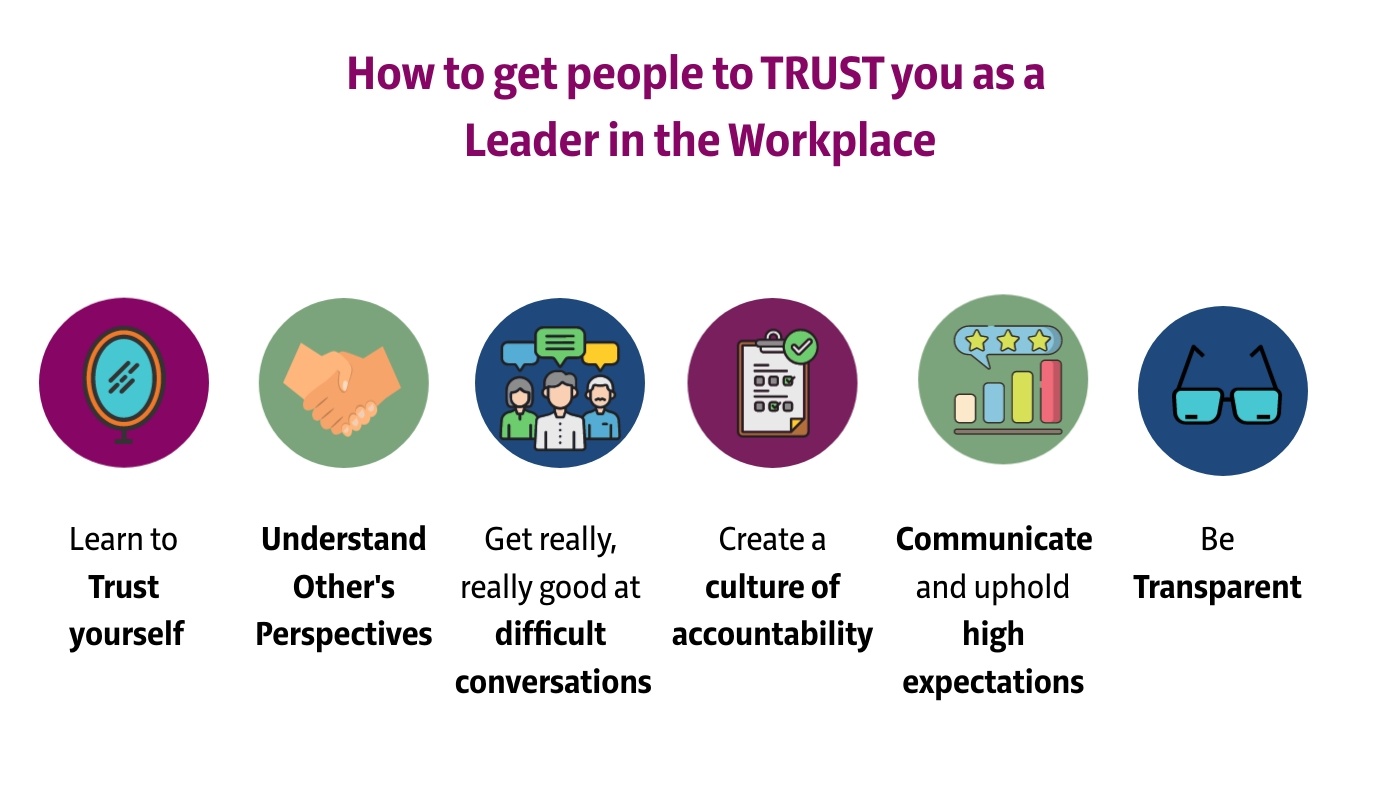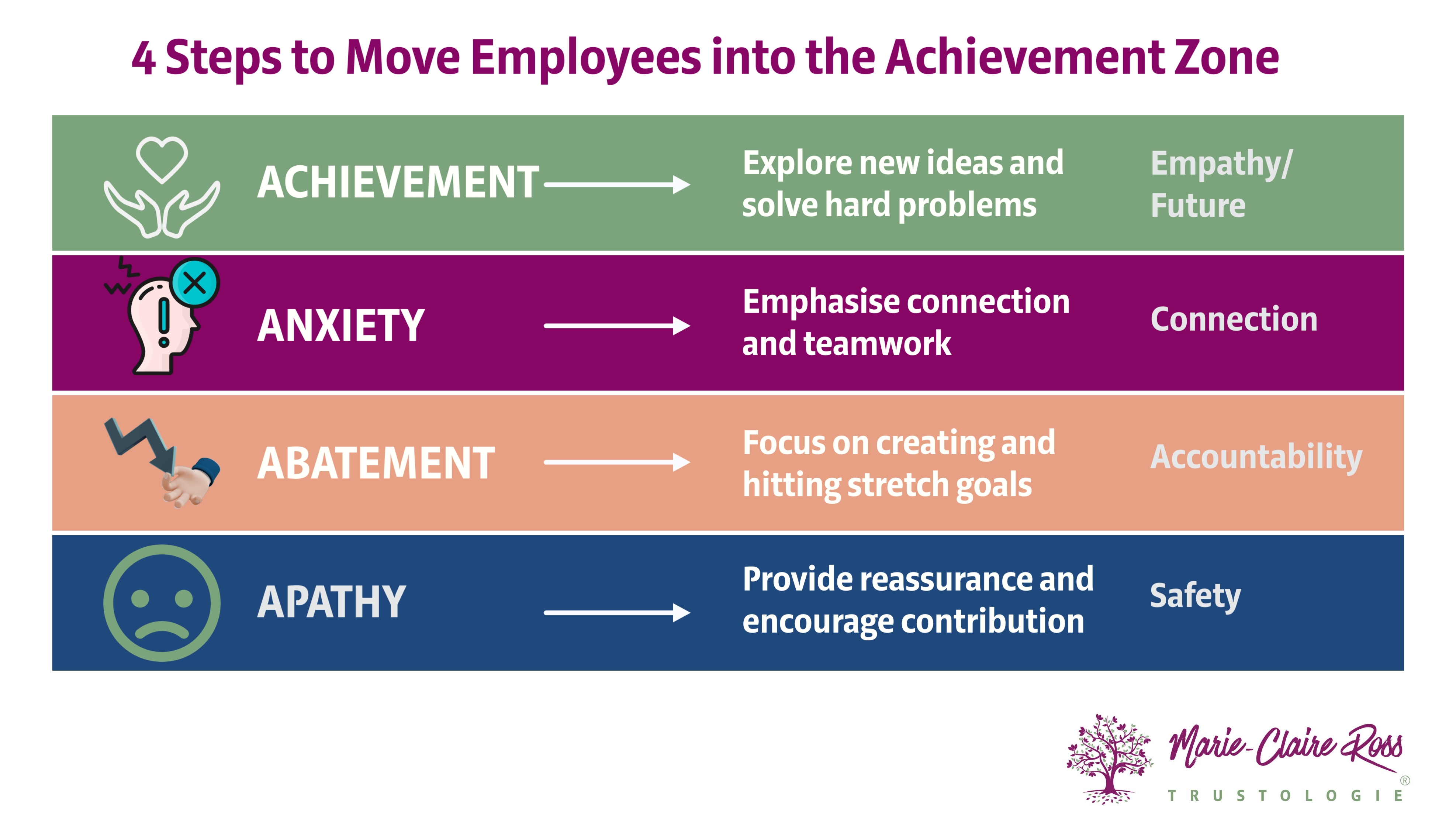11 min read
4 Practical Strategies for Better Emotional Management in the Workplace
I have a friend who often finds herself at the mercy of her emotions. Recently, she called me to rehash a confrontation she’d had with a group of...
Develop leaders, strengthen executive teams and gain deep insights with assessments designed to accelerate trust and performance.

Transform how your leaders think and perform with keynotes that spark connection, trust and high-performance cultures.

Explore practical tools, thought-leadership and resources to help you build trusted, high-performing teams.

Trustologie® is a leadership development consultancy founded by Marie-Claire Ross, specialising in helping executives and managers build high-trust, high-performing teams.

5 min read
Marie-Claire Ross : Updated on July 10, 2024

Whether you are new to leading or you are leading a completely new team, there are certain things you need to do to increase trust with those around you.
In the book, Trusted to Thrive, trust is defined as the ability for everyone in an organisation to confidently rely on (and predict) that others will do the right thing and make good on their promises.
So how can you ensure your reports, your peers and your boss can trust you to do what is needed to be done in a collaborative way?
Before I go into what actions you need to consistently take for people to trust you, I need to go into how the brain trusts others.
What is really important to understand is that the ability to trust others is processed in our limbic brain. This is the part of the brain that doesn't understand language, but feelings.
Trust is processed subconsciously on the part of the brain that has no capacity for language. That’s why you can’t just tell people to trust you. You have to prove it with your actions and doing what you say.
You can't talk your way into trust; you have to behave your way into it.
Building trust with others takes time, patience and being curious about how you can best build a relationship with each individual. There is no one-size-fits-all approach.
Let's take a look at what people need to see from you before they can trust you.

Trusting yourself is the first step to earning the trust of others.
This requires transitioning from being an individual contributor to focusing on the team's collective abilities and performance to drive great results. Leading a team requires a totally different mindset with different behaviours to match.
Employees trust you by seeing evidence that you will do the right thing by them when they make a mistake. That you will judge their performance based on outcomes achieved, not just time in seat. And most importantly, that you trust they are working when you can't see them.
Leaders who lack self-trust often find themselves doubting their decisions, struggling to convey confidence, and give confusing instructions and expectations. The result is tightening up controls and micro-managing. To your reports, this often comes across as you don't trust them.
Looking within ourselves as to how we could be leading others better is not just important for our reports, but us as well. This is really challenging because it can be much easier to blame others, look the other way or make our busyness the excuse.
The solution is to believe that you have the skills to lead your people to help them do their best work. It means knowing that you can learn, grow and adapt your approach in the way best needed for each individual in your team.
Key to all of this is asking yourself:
We don’t trust people who are only interested in themselves.
One of the most important steps in building trust and connection in the workplace is to spend time understanding each individual we need to work with.
Have regular one-on-ones with each of your reports and peers. Ask incisive questions to uncover communication, work styles and receiving feedback preferences. This will help you customise your communication to people both in and out of your team.
The more we understand others, the more we can unlock their potential and be seen as their supportive ally - not a roadblock.
Ask yourself: Am I spending time really getting to understand people's needs or am I more likely to push my own agenda?
The longer we ignore performance issues, the more difficult it is to improve the situation. If we don't deal with an issue quickly, we risk damaging the relationship permanently. Not only that, we risk damaging the performance of our team.
Top achievers feel demoralised when subpar performance is tolerated or when team members are allowed to mistreat others. Allowing underperformance within your team sets a precedent for everyone to lower their standards.
Growing as a leader means recognising there is a problem and working on it. Pronto. This means taking personal responsibility for solving the problem. After all, every relationship is a social contract between one or more people. Every single person plays a part in that relationship. At the heart of it, requires acknowledging the part you play and being willing to fix it.Accountability is about providing structure so that people know what is expected of them, in order to deliver to expectations. High-trust leaders always make their expectations clear, regularly clarifying how work can be done better in service of the customer. They do this through modelling this in themselves - always working on themselves to do a better job; even using a coach or mentor to help them keep momentum.
In my research, I find many high-trust leaders communicate their expectations with an inspiring phrase or a slogan. Employees will even refer to them in conversations with colleagues "We have to raise the bar. Sarah always tells us that. Is this raising the bar?" Clear expectation ensures there is never any confusion between just good enough and great.
Remember, It's not about what we communicate, it's how we communicate with one another.
Ask yourself: Am I communicating clear directives and ensuring people know my expectations?
Visibility in the workplace is critical for building trust.
Admit mistakes, even if it hurts you. It makes you more authentic and human. At the same time, you must demand the real truth from your employees and be a champion of the real truth. And this doesn't mean blaming and berating yourself. Approach the situation with love and respect - for yourself and the other person.
How you deal with wins and losses in your team will dictate how safe people feel to learn. Embrace errors as learning opportunities so that new tactics and best practices are quickly developed to improve. Avoid being defensive about issues or hiding uncomfortable information. Understand that projects or concepts fail, not people. Use a reflective practise that creates a routine for asking curious questions about what worked and what didn’t.
Ask yourself: Am I willing to admit I'm wrong or do I blame things outside of my control?
Being perceived as a reliable leader hinges on valuing others, maintaining transparent communication, ensuring tasks are completed effectively, and minimising any negative feelings among team members through creating a respectful team culture.
For others to place their trust in you, you must first have confidence in yourself. When you trust in your own abilities, it becomes easier to extend that trust to others.
By approaching interactions with a positive outlook and providing support, you create an environment where everyone can collaborate at their best.

11 min read
I have a friend who often finds herself at the mercy of her emotions. Recently, she called me to rehash a confrontation she’d had with a group of...

9 min read
True leadership presence isn’t a performance or a set of charisma hacks; it is the felt experience of who you are being in the room. By cultivating...

13 min read
As teams return from their summer (or winter) break, you may notice subtle shifts in your team’s energy. Even if the end of year was positive, a new...

One of the interesting things I find when it comes to safety is that some safety professionals (some, not all) like to play bad cop when it comes to...

We all remember as kids having to stand up in front of the classroom and do a "Show and Tell" session to the class about our newest toy.

When it comes to safety, no company wants to see staff hurt or property damaged.